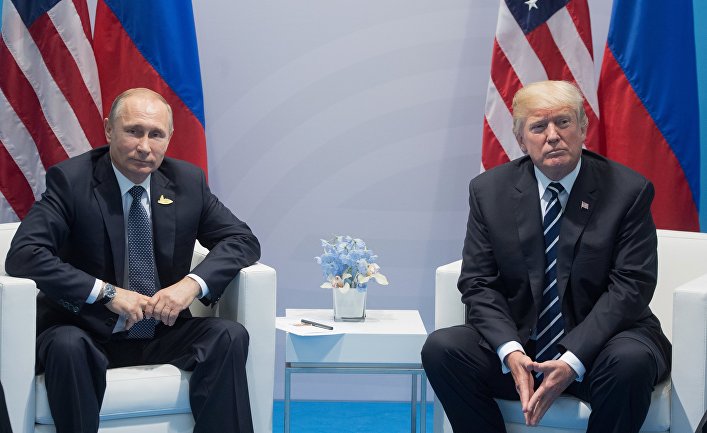
Gilbert Doctorow, Ph.D.
Gilbert Doctorow is the European Coordinator of the American Committee for East West Accord, Ltd. Gilbert Doctorow is a Research Fellow of the American University in Moscow
Merkel bought into the sanctions policy because it was the peaceful alternative to the military option pushed by Washington. By pursuing sanctions at obvious cost to her own people, Merkel could keep the Americans from dominating policies on the Continent towards Russia, and could prevent a general military conflagration on European soil
In the time since the signing of the Minsk-2 cease-fire accords, Europe and the US have gone their divergent ways in their views of the causes of and solutions to the Ukraine crisis. And the most prominent figure in the Minsk deals, if we judge by the international media, Chancellor Angela Merkel, has herself been characterized on the two sides of the Atlantic in opposite castings.
In the US, where the War Party still holds sway over policy made in Washington, Merkel and her position vis-à-vis Russian aggression in Ukraine are altogether described as "stupid,” to quote Senator John McCain. Equally undiplomatic utterances about Merkel have been ascribed to America’s senior diplomat responsible for relations with Europe, Victoria Nuland in the past couple of days.
Meanwhile, in Europe, Merkel and her junior partner on behalf of the EU in the Minsk negotiations, President Francois Hollande, are being called "the dream team” of European diplomacy, and Merkel’s name is being publicly nominated for the 2015 Nobel Peace Prize. Certainly her claims for such distinction are vastly greater than Barack Obama’s were in 2009.
The gnashing of teeth over Merkel by my ideological opponents and the bouquets in her address by those who should be my ideological friends, would seem to put me in an awkward position given that as recently as 27 January I published an opinion essay on this portal under the catchy heading"Merkel Could Have Brokered Peace in Ukraine. Instead She Fanned the Flames.”
I righted this seeming error in my appreciation of Frau Merkel, if there was an error, by another article published on 20 February that, in passing, catalogued Merkel’s crucial role in bringing about the Minsk-2 accords.
Are these two estimations of Merkel in contradiction? Or is there a higher truth?
In this brief essay I argue for the latter point: namely that both sides of Merkel’s behavior over the past six to nine months are in perfect harmony, and this is no small matter because it brings us to a more substantial understanding of what prospects there are for peace today that go beyond the layman’s psychological dissection of world leaders that we see every day in the media as substitutes for the hard work of investigative and analytical reporting.
Lest I myself fall into the trap of overstressing personalities of leaders as the drivers of international politics rather than as contingency factors, I stress that Merkel is not the formulator of German foreign policy. That she has prejudices, particularly as regards Russia, there can be no doubt. But the policies come from her entourage, the party stalwarts of the CDU. Merkel, the Ossie, is to Germany as Obama is to the USA: both are lightweights who were installed in power by leveraging their electoral attractiveness as outsiders to be coopted, read manipulated.
I called attention back in January to the total misreading of Merkel’s policies on Russia in the United States and also in the EU from the beginning of the Ukraine crisis last spring. She was seen as the potential broker in relations with Russia because she was an Ossie, a Russian speaker, who had an alleged special relationship with Vladimir Putin. Instead, we saw successive waves of economic sanctions against Russia over Crimea and the Donbas passed by the EU with Merkel riding herd over her colleagues and acting in close coordination with the US. Hence, the vision of her fanning the flames of conflict.
I pointed out that this was not an arbitrary course she was taking: it reflected a conscious choice to favor relations with Germany’s eastern and southeastern neighbors within the EU who together constitute Mitteleuropa over the previous strategic partnership with Russia. And I pointed both to anti-Russian and pro-Polish, pro-Czech etc. prejudices of part of the class of German industrial leaders, particularly in the Mittelstand as opposed to its multinational corporations, who form the backbone of CDU supporters.
In this context Merkel’s pursuit of sanctions was NOT an expression of subservience to the United States. It was in pursuit of German national interests that have a life of their own. There was merely convergence with Washington’s policy.
At the same time, there was an operative force which I did not go into in my narrowly focused essay of January: Merkel and her advisers bought into the Sanctions policy, because it was the peaceful alternative to the military option which Washington, D.C. placed on the table from the very beginning of the Ukraine crisis. By pursuing sanctions at obvious cost to her own people, Merkel could keep the Americans from dominating policies on the Continent towards Russia, and could prevent a general military conflagration on European soil.
What happened beginning in late January that changed the equation for Merkel, for Germany and for Europe more broadly was the new aggressiveness of the War Party in Washington that began publicly bearing down on President Obama to do something now that sanctions had clearly not caused Vladimir Putin to change course, now that the rebels of the Donbas once again were taking the military upper hand and expanding the territory under their control. The plans in the US to authorize shipments of lethal weapons to Kiev threatened an escalation of the conflict into full-blown US–Russian proxy war on European soil, with the risk of things going out of control leading to nuclear holocaust.
In the world of politics, for Frau Merkel and her advisers the military option now being discussed in Washington was an intolerable double-cross, and this is where the shuttle diplomacy leading to the Minsk-2 accords got its start.
It is curious that even in the Opposition camp in Germany, criticism of Merkel’s anti-Russian policies has not gone beyond cries to save the 300,000 German jobs that depend on good relations with Russia or denunciations of alleged subservience to the Americans in her pursuit of Sanctions. I think in particular of the dramatic speech directed against Merkel’s Ostpolitik delivered last December by deputy leader of Die Linke in the Bundestag Sahra Wagenknecht. Similar remarks were made in the last two weeks by the iconic past leader of the SPD, Oskar LaFontaine.
Surely politicians as trenchant in their analytic skills as Wagenknecht and LaFontaine do not ignore the economic drivers of politics and policies, where we find that the cheap component parts and products made by affiliates and subcontractors in Mitteleuropa fuel the German export miracle supporting millions of jobs at home, whereas good relations with Russia account for just 300,000. But would it be politically wise to call this out and alienate the Mittelstand?



_jpg/250px-ElbeDay1945_(NARA_ww2-121).jpg)







